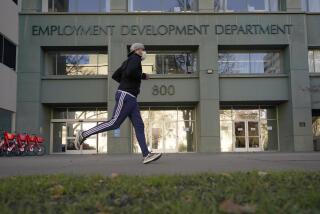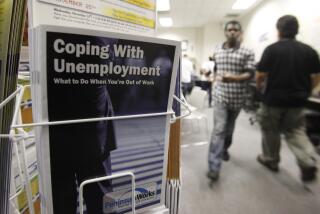Benefits Are Smaller and Harder to Get : Government: Cutbacks in funding spell frustration for unemployed workers filing claims.
- Share via
WASHINGTON — In Michigan, even as the recession deepens, phones often ring unanswered for hours at unemployment offices, and it takes more than a month for a jobless worker to get his first benefit check.
In New York, the lines of anxious, frustrated people waiting to file for benefits are “out the door and around the block,” Labor Commissioner Thomas F. Hartnett told a congressional hearing this week.
After nine years of economic growth, the safety net that supports workers in hard times has become noticeably frayed.
It’s a dual problem: Officials complain that the system doesn’t have enough administrative money to run smoothly in disbursing benefits. And for the jobless worker, there are significantly fewer checks available than during past recessions.
Unemployment insurance programs run by the individual states offer 26 weeks of benefits to the jobless. In the 1970s, by contrast, various supplemental and extended federal programs could combine with the state program to offer as much as 65 weeks of benefits.
These programs were cut back sharply in the 1980s. Today, there is just one extra program, offering 13 weeks of benefits in addition to the basic 26 weeks. Only four states--Alaska, Maine, Rhode Island and Michigan--meet the current, more stringent standards for triggering these extra benefits.
California has escaped the administrative problems plaguing many other states, according to Suzanne Schroeder, information officer with the state Employment Development Department in Sacramento. Checks are being mailed promptly three weeks from the day a person enters an office to file a jobless claim.
“No one is aware of any unusually long delays” in standing on line to file at local offices, she said. People may wait 20 minutes before seeing a claims representative.
The fund from which benefits are paid is in good shape, totaling $5.3 billion. The state expects to pay $2.6 billion in benefits this year, she said. Because of the surplus, the tax schedule for employers is at its lowest of seven possible levels.
By contrast, a number of states are likely to run out of money to pay benefits within a few months, including Connecticut, Massachusetts, Michigan, Missouri, Ohio, West Virginia and Arkansas. If the funds are exhausted, these states would be forced to get loans from the federal government to assure that benefit checks keep flowing.
For those workers who qualify for benefits, it’s often a long and tedious road to file claims.
“The basic problem is that the capacity of the system was reduced so much in recent years when unemployment was low,” said Cheryl Templeman, unemployment insurance director for the Interstate Conference of Employment Security Agencies--the state offices that disburse benefits.
“We don’t have the offices and staff to respond now that unemployment has gone up,” she said Friday.
Indiana closed 17 local offices and laid off 100 staff members last year. But the workload jumped to 57,330 claims a week in December from 29,670 a week in October.
The shrunken work force can’t get the checks out promptly, according to Bob Wagner, the unemployment office manager in Bloomington. “You spend countless uncompensated hours in evenings or on weekends trying to make sure as many claimants as possible get their checks next week,” he told a recent congressional hearing.
“You listen daily to frustrated claimants accusing you of being responsible for their having lost their home or their car or not being able to buy groceries for the family or pay their bills,” Wagner said.
Jobless residents of Connecticut often wait five weeks or more to get an initial benefit check.
One office in Maine became so crowded that a fire marshal threw out some of the people waiting to file claims.
The House voted to provide an additional $200 million to help state offices handle the increased workload. The Bush Administration had recommended a $100-million increase.
The funding request will be considered by a Senate committee next week.
STATES IN TROUBLE States with benefit troubles Indiana: 17 offices closed last year; currently has long waiting lines and delays Michigan: First benefit checks not available for at least a month; long waiting lines Connecticut: First benefit checks not available for 4 or 5 weeks or more; long lines around the block at local offices New York: Lack of computer terminals to handle ballooning number of new claimants New Mexico: Long waiting times to file States in danger of running out of money to pay benefits: Connecticut Massachusetts Michigan Ohio Missouri West Virginia Arkansas also: District of Columbia Sources: Interstate Conference of Employment Security Agencies; Urban Institute
More to Read
Inside the business of entertainment
The Wide Shot brings you news, analysis and insights on everything from streaming wars to production — and what it all means for the future.
You may occasionally receive promotional content from the Los Angeles Times.










